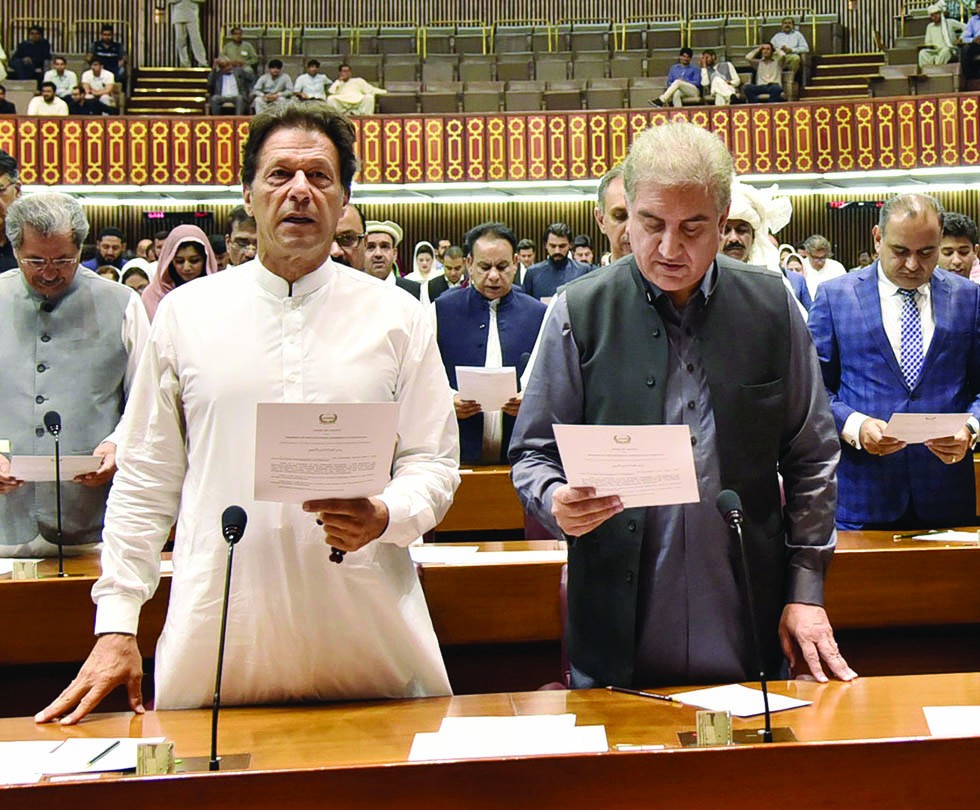
With the PML-N and PPP posturing as two separate entities, who will play the role of de facto opposition in the next five years?

It took Prime Minister Imran Khan more than 40 minutes to make his maiden speech on the floor of National Assembly after getting elected on August 17. The only reason of this delay in his speech was the hullabaloo created by the main opposition party -- Pakistan Muslim League-Nawaz (PML-N), sending shock waves to the new ruling party Pakistan Tehreek-i-Insaf (PTI) along with a clear message for them to be ready for more attacks like that in future.
With a noise-free device in his ears, Khan hurriedly delivered his short speech, emphasising on the fact that his government would not be undermined through such tactics of the opposition parties.
The assembly session that was held on August 17 to elect the 22nd prime minister of Pakistan was but a glimpse into the kind of opposition that the newly crowned PTI is going to face in the future. Even though the initial ruckus may settle in the coming weeks and months once the parties get down to the business of law-making, the complexion and role of opposition will be crucial.
The PTI government will have to go through a similar situation in the Punjab Assembly where the Hamza Shahbaz-led opposition party PML-N is present in a large number.
Following the declaration of election results on July 25, the initial impression given by the opposition parties was that of unity, and a unanimously evolved strategy, however this impression was dispelled later. Initially, the main opposition parties developed differences with the Jamiat Ulema-e-Islam (F) President Maulana Fazal-ur-Rehman who was in favour of not taking oath and boycotting the newly elected assembly. Later, at the time of election for the slot of prime minister, Pakistan People’s Party (PPP) withdrew its support for the opposition’s consensus candidate for PM, Shahbaz Sharif, and preferred to abstain from voting, giving a serious shock to the PML-N. Furthermore, Khan’s speech and criticism of opposition after this hullabaloo further riled up the opposition parties.
Whether the opposition parties will remain united in and out of the house, remains a key question because every party has its own political interests to think of. Amid doubts that, away from power, the PML-N will wither as a political party, the way Pakistan People’s Party is posturing itself as a separate entity, and the near absence of erstwhile Islamic parties within the house, one isn’t sure who will play the role of de facto opposition in the next five years.
"There is no doubt the PTI government will be facing a very tough opposition because they are new in power corridors, while the key opposition parties belong to a trained political class," political commentator Farrukh Sohail Goindi observes, adding, "All these opposition parties are more experienced in traditional parliamentary politics as compared to the PTI."
It can be the most powerful opposition in recent history, he says. "The new government will have to face a tough opposition not only in the National Assembly but the Punjab Assembly and Senate as well."
However, he doesn’t expect a long-term united opposition because of differing political interests of the parties. "The PPP is playing this game wisely by not consistently siding with the PML-N, as they have a huge political interest in the Punjab province where they have got a very encouraging response in these general elections," Goindi opines. The PPP is playing a double game and is trying to become an alternative choice both in and out of the assemblies. Similarly, there is a split within the Muttahida Majlis-e-Amal (MMA) due to the competing political interests of JUI-F and Jamaat-i-Islami (JI).
Moreover, some PML-N insiders rule out the chances of any reconciliation with the PPP and trusting the party in future. Interestingly, PPP has already announced its independent candidate, Chaudhry Aitzaz Ahsan, for the upcoming presidential election.
"We believe the PPP favoured the PTI by abstaining in the PM election despite the promises they made with us," says PML-N senator Mushahid Ullah Khan, adding, "We are not going to trust Asif Zardari next time."
Along with the making and breaking of opposition alliances, the PML-N itself is facing internal grouping issues. A hawkish group within the PML-N is not happy with Shahbaz Sharif as opposition leader because of the alleged internal differences over policies between Nawaz and Shahbaz Sharif. His poor presentation in the National Assembly on the day of election for prime minister and absence in the initial protests against rigging outside the office of Election Commission of Pakistan in Islamabad, was noticed both in and outside the party.
Read also: The shape of the new house
"It was a brief alliance of the opposition parties and it broke immediately after the failure of call of Maulana Fazal ur Rehman to boycott the National Assembly. PML-N and PPP are two major opposition parties and they lack basic mutual understanding," says political commentator Zahid Hussain.
"The reason of cracks within the opposition alliance is very clear because one of the main opposition parties, PPP, has its own stakes, particularly in the second largest province of the country, Sindh which it is currently governing. This time PTI has emerged as the second largest party and the main opposition party in the province. The PPP lost in the urban areas of Sindh and PTI has replaced it," he says, adding, "PPP has to cooperate with PTI on different issues and that is why it will continue to distance itself from PML-N and will have its own strategy."
Hussain says the opposition alliance will be issue- and need-based. The PTI is likely to face a tough time at the hands of opposition; "however, it can overcome this because of interest-based divisions within the opposition parties".